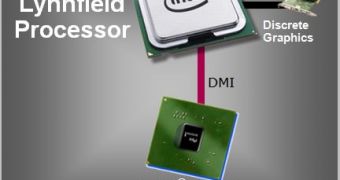After having announced its Q4 2008 financial results, the Santa Clara, California-based chip maker Intel is said to be planning to postpone the release of its next-generation mainstream processors, codenamed Lynnfield. In addition, the company is also considering delaying the launch of the P55 chipset, which is now expected to be unveiled at the end of August or the beginning of September, along with the aforementioned CPUs. The chip maker is said to be considering an even further launch date of both products, depending on the market situation.
According to a recent news article on Digitimes, Intel has announced motherboard makers that it will postpone the release of both its P55 and Lynnfield products until later in the year. The two products were initially scheduled to be launched by the end of July this year, but the chip maker is now considering the ongoing economic decline, which is the reason why motherboard makers have found themselves with overstocked chipset inventory. Both of the aforementioned Lynnfield CPUs and the P55 chipset are expected as a refresh to the company's mainstream product portfolio. After the release of the P55, the chip maker is said to be planning the phase-out of its non-IGP P45 and P43 chipsets, also transitioning its 4-series IGP chipset to the entry-level.
Digitimes also reports that the company is expected to provide motherboard makers with engineering samples of its next-generation entry-level CPU, codenamed Havendale, in February this year. The design validation test (DVT) is expected to be completed in July to August this year, while mass production is slated for September to October. As with the Lynnfield CPUs, the company decided to postpone the launch of the new Havendale processors to January next year, thus allowing more time for its current entry-level CPU inventory.
Intel appears to have been affected by the ongoing global financial crisis in the same way as other major industry players have. The company has just reported a 90% profit drop in the fourth quarter of 2008. However, its Atom product segment has managed to rise by 50% to $300 million, confirming the increasing popularity of the netbook market segment.

 14 DAY TRIAL //
14 DAY TRIAL //